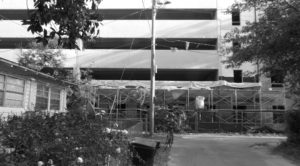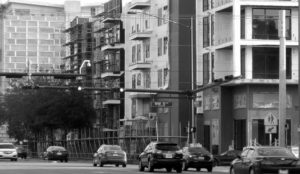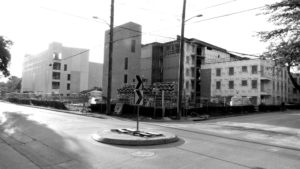by Lee Malis

Photo by Lee Mallis.
Since 2016 there seems to be an assault on Gainesville. For those of us who remember what it was like before, it’s hard to believe this is the same town we’ve known forever. Gainesville was known as a Tree City USA for good reason. We had a beautiful city with a healthy tree canopy of mature hardwoods. There were mandates for green spaces, setbacks, parking, and density. But that’s all changing. Now if you drive down University Ave., 13th St., or NW 5th Ave., or visit Porter’s Quarters or downtown, you see massive development everywhere. This is because our city government has been changing the rules to make Gainesville developer-friendly.
The most depressing example is the NW 5th Ave. neighborhood, the historical heart of the Black community. It is bad enough that a developer is building a massive luxury student apartment complex there, but the worst part is that it is being built on land bought by the federal government’s Housing and Urban Development (HUD) for low-income housing. This apartment complex is about a whole city block in a small residential neighborhood. Residents hired a lawyer and appealed city staff’s decision to allow this development to go forward “by right,” at considerable costs of litigation. At a meeting last year, over 300 people voiced opposition to the Administrative Law Judge, to no avail, because city staff said the developer was complying with the 2017 Land Development Code, which gave him the right to build despite public opposition.

Now the next battle of Mayor Poe’s final term is looming, a renewed plan to consolidate all residential zoning and allow “small-scale multifamily development” up to quadraplexes with no occupancy limit throughout the city. City officials are eliminating whatever little bits of code we had left before they leave office. Two of the Commissioners supporting this “inclusionary zoning” plan, Harvey Ward and David Arreola, are running for mayor. Enough public outcry at the upcoming meetings could delay this vote until after the city elections in August. After three “housing workshops” (May 9, 17, 21), the plan will go back to the Plan Board for a recommendation on May 26. If the Plan Board approves, it will go to the City Commission for approval as an ordinance in June or July. If approved then, it will be irreversible. Citizens will not be able to undo the plan. It is now or never. Contacts for getting involved are at the bottom of this article.
To understand what is happening now, we need to look at what has changed in city government in the past six years. The shift began under former City Manager Anthony Lyons, who was hired in April 2016, and the subsequent hiring of Wendy Thomas as Director of the Department of Doing, the new name of the Gainesville planning department. The name change was to let developers know that they are ready to do business. Lyons had a degree in Art History and no previous experience in city management. Thomas left Bozeman, Montana, under a cloud of discontent, where she supervised the City’s comprehensive plan, leading to a public outcry by the organization Save Bozeman.

In a letter to the Bozeman Chronicle, Save Bozeman asserted that “adjoining neighborhoods were not invited to participate in the NCOD code update process. In addition, public notice indicating potential stakeholder impact was minimal and inadequate as indicated by the utter lack of neighborhood awareness or involvement in a process. Further, public documents indicate that a number of task force members appear to have had a clear conflict of interest.” This echoes what is happening in our city.
Under the Gainesville code that was approved in 2017, no development plan requires a public hearing by the Development Review Board, the Plan Board, or the City Commission unless the developer was seeking a zoning change, a variance, or a special use permit. The public only gets a “Neighborhood Workshop” in which the developer tells the residents what they are going to do. If the developer complies with the code and has staff approval, the public is unable to modify or stop the development as the developer is able to claim the development is “by right.”
In August 2018, with little public engagement, the Department of Doing proposed a massive rezoning initiative called GNV RISE. The city tried for months to sell the ideas to the public, but the effort backfired. Hundreds of people showed up at City Hall in opposition. They wanted changes in the pace and style of development and, even more important, a greater say in such decisions. Over 60 people spoke against the plan at the last hearing, while only three people spoke in favor of the Department of Doing’s plan, including future Commissioner Reina Saco, an ally of Mayor Lauren Poe. Wendy Thomas soon resigned and her former deputy, Andrew Persons, became head of the Department of Doing, which was renamed the Department of Sustainable Development. Lyons was forced to resign as city manager and now is vice president of AMJ, a local development company that has gotten almost $2 million in concessions from the city for a downtown hotel and planned high-rise.
In 2020, during the COVID-19 pandemic, the commission voted 4-3 to approve three-story triplexes anywhere in Gainesville, any neighborhood, as accessory dwelling units, ADUs. What’s proposed now would increase that to quadruplexes with no limits on number of bedrooms or occupants and no parking requirements and almost no setbacks from the properties around them. This means potentially more demolitions, more destruction of trees and loss of yards and gardens and the green spaces, such as Florida Park, Kirkwood, and other tree-covered neighborhoods which are the lungs of the city. This destruction will make way for new apartments owned by corporate investors. These changes are made to give “predictability” to developers but no predictability for any homeowners or homebuyers anywhere in the city.

The Mayor and the Commission justify their actions as efforts to increase affordable housing and equity. They also assert that infill will stop the destruction of forests in the county. However, the city incinerates trees for electricity, burning countless thousands of gallons of diesel to destroy forests and transport and chip and incinerate them, releasing carbon and calling that “renewable energy.” The city is billions of dollars in debt to Wall Street for its tree incinerator, and the commission is looking at adding another, while utility bills keep rising. And if you drive in any direction outside our city (except the predominantly African American communities on the East side), you will see that trees are being clear-cut as fast as possible. None of the developments built in these areas are affordable or low-income. The need for affordable housing is not going away with the massive infill. It’s getting much worse. They are tearing down affordable housing to build high-rise student apartments.
Mayor Poe implied that those who disagree with his planning vision are racists or NIMBYs. I’m not sure how he made that leap. At the commission meetings on GNV RISE and since, numerous Black community leaders spoke out against Poe’s plan, including Aaron Green, former mayor and a resident of the 5th Avenue neighborhood, Roberta Parks, the 5th Avenue Neighborhood Association chair and a resident of the neighborhood for over 80 years, and Faye Williams, community activist from the Porter’s Quarters community. None of them believed that Poe’s plan was going to be good for Black or poorer communities in Gainesville.
Back in 2016-17 Poe, Santos, Ward and Arreola all touted their progressive ideas and promised to “protect neighborhoods” and promote green spaces, greater economic equity, and increase social and racial justice. We thought life was safe and good in Gainesville, and all that we had to worry about was Trump, the destruction of American democracy, and the death of our planet. Ever since they were elected they’ve been chipping away at every protection we used to have. Many of us who value justice, the natural world, and our local community are disheartened and even disgusted by what has been done by these so-called progressives.
Thank you to Robert Mounts and Anna Peterson for assistance with this story.
If we want to stop the destruction of what we value in our city, we have to speak out now. To get more informed and involved follow: Gnv Neighbors on Facebook. Read articles and sign up for Gainesville Neighborhoods United email at: gainesvilleneighborhoodsunited.org/. Contact Save Gainesville by email at: savegainesvillefl@gmail.com.
